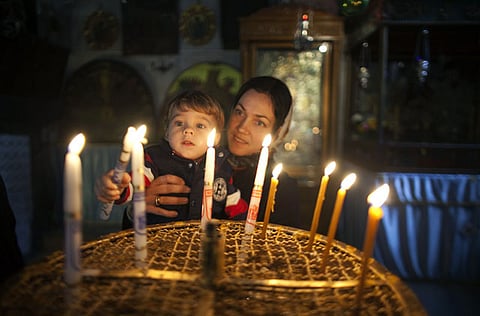Middle East Christians worried about Arab Spring?
We look at what it means to be a Christian in the region the new is ringing out the old

Dubai: The Middle East is heaving with the movement of change, the new is ringing out the old. At this momentous point in history and keeping sight of it being Christmas, we look at what it means to be a Christian in the region.
Apparently, it is a strange predicament. They want freedom and a new economic order but are worried that new Islamic governments would offer the opposite.
This means they appear to be sitting on the fence when it comes to the Arab Spring. Or are they?
The top Roman Catholic clergyman in the Holy Land, Patriarch Fouad Twal of Jerusalem sent a message of hope and support to Christians of the region on the occasion of Christmas. He expressed his support for the Arab spring adding that Christians “are not alone, many people, including the Vatican, are concerned about the situation and this gives more hope.”
He added that he was concerned about the continuing struggle and bloodshed in Egypt, Syria and elsewhere. In his message, Patriarch Twal urged Christians in the region to become involved, so they are not excluded from the movements.
“We want our Christian faithful to be involved and not feel foreign in this movement,” he said. “They have full citizenship. It is their land, their country, their present, their future.”
Patriarch Twal expressed his concern for the fate of Christians because of the upheavals and called for authorities to “protect the minorities” in the region.
Several international reports have showed that the Christians of the Middle East are declining in numbers. Many factors play a role in that, but the most prominent reason is the political upheavals of the region, and in some places apparent persecution and violence.
Iraq, for example, home to Syriac Christians, who are ethnic Assyrians, and numbered roughly 2 million in 2004, has suffered a significant decline in numbers, as many of them fled to Europe and America.
Christian numbers have slumped to around 500,000 according to a UN report, an estimated 2,000 Christians were killed, and 70 churches have been attacked or bombed since the war on Iraq started.
International reports say that Islamic militants have systematically attacked Christians in Iraq since the collapse of Saddam Hussein’s regime - these extremist groups, mostly Al Qaeda and its offshoots, consider Christians to be infidels.
Putting that in context, we asked a Lebanese Christian, who preferred to withhold his name, about his aspirations and fears in the Middle East, in view of Arab Spring and Islamic parties gaining power. He said: “Christians survived 2000 years, survived conquests, the Ottoman Empire and lately all the colonisations and dictators.”
He said that he is not afraid of Islamic parties coming into power, as Muslims consider “Christians to be followers of a holy book”. However, he added that he like many other Christians he knows of, are “wary of extremist action”.
This is a sentiment echoed in Syria, where many of the 2.5 million Christians are apparently supporting President Bashar Al Assad amidst ongoing protests in the country. A Christian from Syria, who also wished to remain anonymous for fear of repercussion, explained that they prefer “a brutal dictator who guarantees the rights of religious minorities to the uncertain future that Assad’s departure might bring”.
But, there are also those Christians who feel otherwise and come out to stand with their Muslim brethren. One of them said to the Gulf News Tablet: “The Syrian regime propaganda that Islamists terrorist are the one’s behind the unrest is mainly to exploit the Christians fear of Islamists for their own end.”
Editor’s Note: To read more, download Gulf NewsTablet Edition on the iPad. It is free and you get two editions a day. Log on to the Apple store and check it out.



